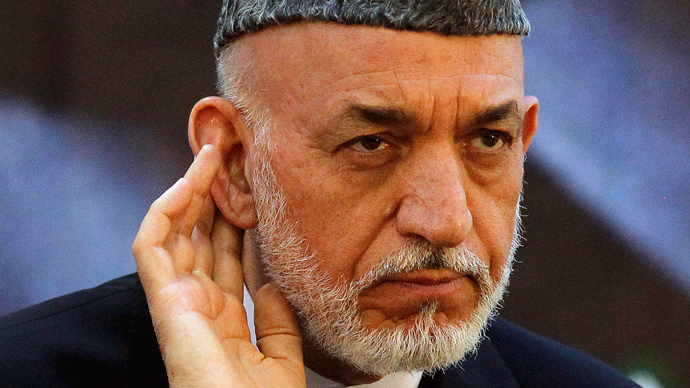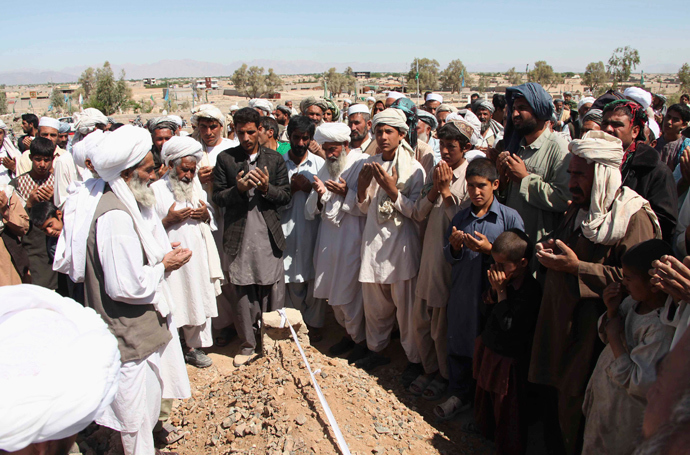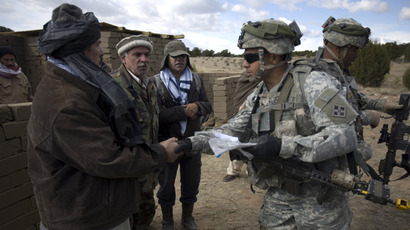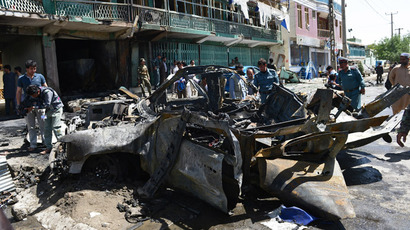Afghanistan suspends US security negotiations as Washington readies Taliban peace talks

Kabul has suspended talks with Washington on a bilateral security pact - designed to chart Afghanistan's security path following the US withdrawal next year - as well as upcoming discussions with the Taliban.
With the US prepared to draw down its troop presence in Afghanistan next year, and the Taliban seemingly determined to make the exit as unpleasant and unpredictable as possible, Washington and Kabul have been working since November on a Bilateral Security Agreement (BSA). But now that initiative is at risk of being abandoned.
Afghan President Hamid Karzai has emphasized in the past his desire to hold one-on-one talks with the Taliban. However, those hopes were dashed when US and Taliban officials announced they would begin joint talks - beginning as early as this week - apparently before the Afghan government was consulted on the issue. This provoked a strong response from the Afghan leader.
"In a special meeting chaired by President Hamid Karzai,
the president has decided to suspend talks about a security pact
with the US because of their inconsistent statements and actions
in regard to the peace process," Karzai spokesperson Aimal
Faizi told Reuters.
At the same time, the Afghan leader said his country will
not participate in the upcoming Qatar talks with the
Taliban.
"As long as the peace process is not Afghan-led, the High
Peace Council will not participate in the talks in Qatar,"
Karzai said in a statement, referring to a government body he
created in 2010 to seek a negotiated peace with the Taliban.
A senior Afghan official told Reuters the government was
dissatisfied over the official status being given to the Taliban,
who opened an office in Doha on Tuesday.

Meanwhile, there has even been disagreement over the name
tentatively chosen for Afghanistan, which apparently does not sit
well with the Afghan president.
"The president is not happy with the name of the office. We
oppose the title the 'Islamic Emirate of Afghanistan' because
such a thing doesn't exist," Faizi said. "The US was aware
of the president's stance."
US Secretary of State John Kerry personally called Karzai to
reassure that the offending sign will be taken down, and salvage
the chance for talks.
The Afghan-US standoff hints at political intrigue between Kabul
and Washington, as both sides are attempting to exert some
semblance of control before next year’s US troop withdrawal
commences.
Is the Taliban a reliable partner?
US officials said the American and Taliban representatives will hold bilateral meetings in the coming days. But is this plan realistic or just wishful thinking?
Washington intends to sit down at the negotiating table with the
Taliban Political Commission, a largely unknown group authorized
by the Taliban’s one-eyed leader Mullah Mohammed Omar, the same
individual who Washington put on a wanted list for harboring
Osama bin Laden and Al-Qaeda militants prior to the September 11
attacks.
US officials said they had no additional information on the
identities of the other members of the commission, but “it
apparently includes or represents armed insurgent groups that
include the Pakistani-based Haqqani network, which has carried
out some of the most ambitious attacks on international forces in
eastern Afghanistan and in Kabul, the Afghan capital,” the
Los Angeles Times reported.
President Barack Obama acknowledged problems ahead for Washington
as the US troop withdrawal looms.

"This is an important first step toward reconciliation,
although it is a very early step," Obama said as he concluded
meetings in Northern Ireland with leaders of the Group of 8
industrialized nations. "We anticipate that there will be a
lot of bumps in the road."
As soon as the US leader finished his speech, the "bumps"
immediately became apparent as four US troops were killed in a
well coordinated attack by the insurgent group. Taliban
spokesperson Zabiullah Mujahid said Wednesday that the militants
launched two rockets into Bagram Air Base late Tuesday, AP
reported. US officials confirmed the military base had come under
attack by indirect fire, and that four US troops were killed.
Karzai's High Peace Council had been expected to also hold its
own discussions with the Taliban a few days later, but the fate
of those talks is now uncertain.
The Taliban announcement that it would hold bilateral talks with
US officials came as Afghan forces formally assumed control on
Tuesday from the US-led NATO coalition for security in
Afghanistan. US and NATO military forces will now move into a
support role.
The handover marks the latest step in the withdrawal of coalition
forces, which currently number around 100,000 troops from 48
countries, including 66,000 US soldiers.
This NATO-led force will be halved by the end of the year, and by
the end of 2014 all troops are to leave and be replaced by a
smaller force devoted to training and advising the Afghan
forces.
Despite their differences, Kabul and Washington do seem to agree
on one point.
Obama said on Wednesday he welcomed Karzai's statement that
Afghanistan would soon take responsibility for security from the
U.S.-led NATO peacekeeping force.
"We do think that ultimately we're going to need to see
Afghans talking to Afghans about how they can move forward and
end the cycle of violence there so they can start actually
building their country," the US leader said.
The United States has lost 2,235 soldiers in the 12-year war. And
Afghanistan is more unstable than it has ever been, Dr Conn
Hallinan, a columnist at the online journal Foreign Policy in
Focus, told RT.
“There is a war going on and we haven’t declared a
ceasefire,” Hallinan said. “And if we are not going to
declare ceasefire, why should the Taliban declare a
ceasefire?”
“The United State has lost this war,” Hallinan added.
“This is an unmitigated disaster. And essentially what the
United States is trying to do is to stop the haemorrhaging but at
the same time still maintain some kind of presence in
Afghanistan. Whether the Taliban will allow that – that’s not
clear.”














